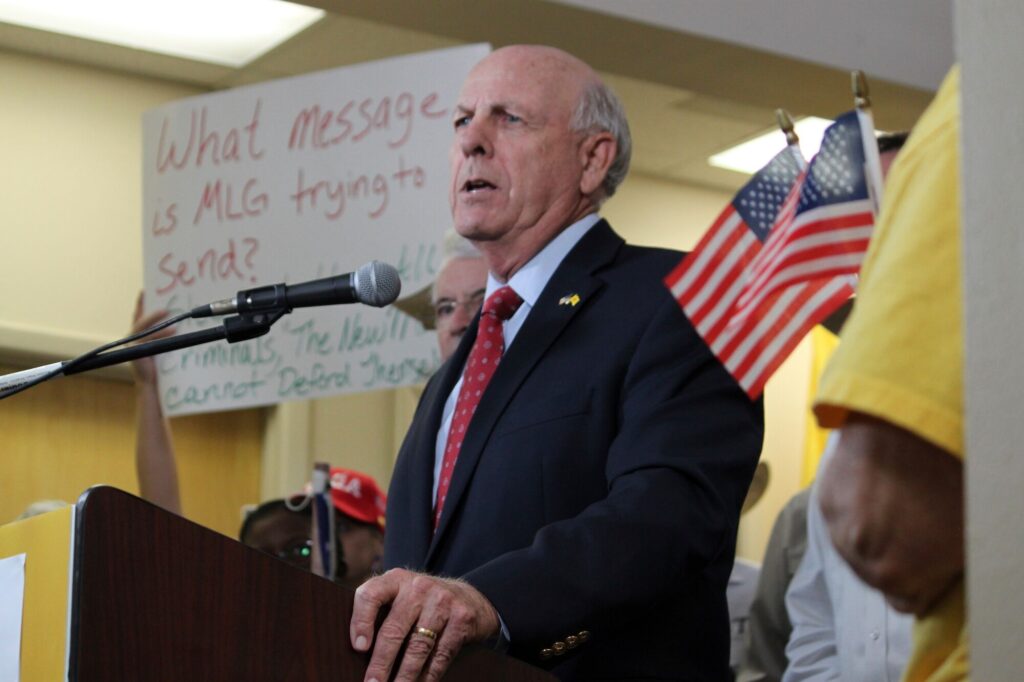How Colorado’s congressional delegation voted (July 29, 2017)
On the Amendment S.Amdt. 667 to S.Amdt. 267 to H.R. 1628 (American Health Care Act of 2017)
This was a vote to pass S. Amdt. 667 in the Senate.
The vote on this amendment was for a partial or “skinny” repeal of the Affordable Care Act, also known as Obamacare, which political analysts say is likely to have eliminated chances the Trump administration can replace it with a different health care program anytime soon. The Republicans’ proposed replacement, called the American Health Care Act of 2017, was unpopular with insurers because it would repeal the Obamacare requirement that all American taxpayers purchase health insurance. However, it still would have required insurers to accept all applicants, regardless of whether they suffer from pre-existing health problems. It also would limit the authority of insurers to restrict the kinds of coverage available to their customers. Conservative Republicans did not like the fact the amendment rejected by the Senate early Friday morning would repeal only part of Obamacare, which is why it was called a “skinny” repeal. Even some moderates complained that the limited repeal of Obamacare would be inadequate to prevent the rising cost of insurance premiums and the fact some insurers are withdrawing from the high-risk market. The final vote to kill the American Health Care Act came from Sen. John McCain (R-AZ), who said the skinny repeal was inadequate to fix Obamacare problems. He wants Congress to begin again with new proposals and hearings. McCain’s vote tipped the balance to make the amendment fail by a 49-to-51 margin.
Failed.
Senate:
H.R. 3364: Countering America’s Adversaries Through Sanctions Act
This was a vote to pass H.R. 3364 in the House and Senate.
This bill would impose further sanctions against Russia, North Korea and Iran. It also rebukes President Donald Trump by requiring him to seek permission from Congress before he could remove any of the sanctions. It comes at a time Trump is being investigated by the FBI and Congress for possible collusion with the Russian government in trying to sway the last presidential election in his favor. The bill passed overwhelmingly in the House and Senate and unanimously by the Colorado delegation to Congress. The bill imposes sanctions against Russia on issues and markets involving cybersecurity, crude oil projects, financial institutions, human rights abuses and others. Provisions directed at North Korea are intended to shut out nations and companies from the U.S. market if they simultaneously deal with North Korea. China, which provides about 90 percent of North Korea’s foreign trade, would be hit hardest by the bill. Countries that give North Korea military assistance would banned from U.S. financial aid. The sanctions against Iran are intended to punish the country primarily for its development of ballistic missiles and weapons of mass destruction. The bill gives the president broad authority to penalize anyone who assists Iran’s military.
Passed.
House:
Senate:
S. Amdt. 270, the Better Care Reconciliation Act
This was a vote to pass S. Amdt. 270 in the Senate.
This bill amendment represented another Senate vote on a proposal to repeal and replace parts of the Affordable Care Act, also known as Obamacare. The proposal is called the Better Care Reconciliation Act. The main parts of the bill would reduce the federal deficit by $420 billion, reduce Medicaid spending by $756 billion and eliminate individual and employer mandate penalties for failing to purchase health insurance. It would result in result in about 22 million fewer Americans having health insurance compared with the current Obamacare law, according to a Congressional Budget Office estimate. Other provisions would add $182 billion in new funding for states to help pay health insurance premiums of persons who cannot afford them and $45 billion in new spending on substance abuse treatment and recovery. In addition, Health Savings Accounts could be used to pay premiums. The bill would have halted Medicaid funds for Planned Parenthood and allowed insurers to sell unregulated plans if they also sell a regulated plan. So far, nearly all amendments and efforts to repeal the Affordable Care Act have failed to win majority approval in the Senate, including this one.
Failed.
H.J. Resolution 111: Providing for Congressional Disapproval under Chapter 8 of Title 5, United States Code, of the Rule Submitted by the Bureau of Consumer Financial Protection Relating to Arbitration Agreements
This was a vote to pass H.J. Resolution 111 in the House.
This joint resolution of the House and Senate revokes a recent Consumer Financial Protection Bureau (CFPB) rule that prohibits financial firms from requiring consumers to sign mandatory arbitration agreements to resolve contract disputes. The rule regulates the use of arbitration agreements for specific consumer financial products and services. It prohibits the use of arbitration agreements that seek to prevent consumers from participating in class action lawsuits. The resolution’s supporters say the CFPB’s current arbitration rule would force consumers into expensive legal fees in contract disputes. The rule also requires consumer financial service companies to provide the CFPB with information about arbitrations. A similar resolution is pending in the Senate.
Passed.
S. 114: Department of Veterans Affairs Bonus Transparency Act
This was a vote to pass S. 114 in the House.
This bill requires the Department of Veterans Affairs to submit annual reports to Congress on performance awards and bonuses it pays to its own personnel. It was intended to enforce transparency and reduce self-serving, excessive bonuses. Each report would need to list the amount of awards or bonuses, the job titles of the recipients and the location where each bonus recipient works. The House version would have added $2 billion to the Veterans Choice Program, which pays for veterans to be treated by community health providers outside the Veterans Administration. Many veterans opposed the community health provider provision because the $2 billion would have been taken from other Veterans Administration programs.
Failed.
Source: GovTrack











